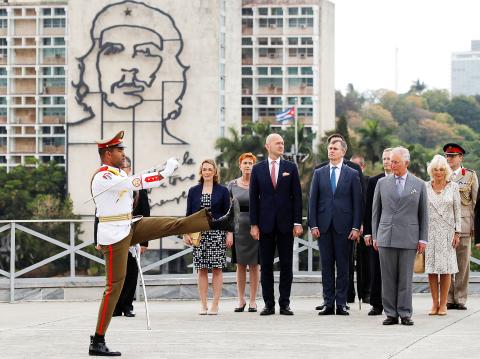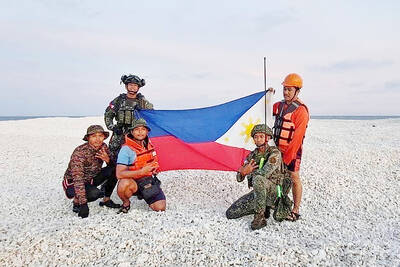Prince Charles and his wife, Camilla, on Sunday began the first official trip to Cuba by the British royal family, in a pomp-filled display of disagreement with the US administration’s strategy of economically isolating the communist island.
The heir to the British throne arrived in Havana and laid a wreath at the memorial to colonial independence hero Jose Marti, near massive portraits of socialist revolutionary icons, including guerrilla fighter Che Guevara.
The next two days included visits to historic sites, a solar park, organic farm and biomedical research center, and a meeting with entrepreneurs, cultural gala and dinner with Cuban President Miguel Diaz-Canel.

Photo: Reuters
It does not include visits with political dissidents or other critics of Cuba’s single-party system, a decision that has prompted criticism from Cuban exiles.
US Senator Rick Scott of Florida last month asked Prince Charles to cancel his trip given Cuba’s support for Venezuelan President Nicolas Maduro and the island’s “decades-long history of persecuting and imprisoning its defectors and repressing its people.”
US Senator Marco Rubio, another senator from Florida, also has long advocated for isolating Cuba and Venezuela, and the senators have found a receptive audience in US President Donald Trump’s administration, which has been tightening financial sanctions on both countries in the hopes of toppling their governments.
Trump has seen European and Latin American support for his Venezuela policy, but less backing on Cuba, whose government has already withstood a 60-year US embargo without showing any signs of losing its grip on power.
British Minister of State for Europe and the Americas Sir Alan Duncan wrote Scott last month that “like a number of other countries, we believe that the best way to promote human rights and encourage a Cuba that fully respects fundamental freedoms is through practical diplomacy, such as with this visit.”

Kehinde Sanni spends his days smoothing out dents and repainting scratched bumpers in a modest autobody shop in Lagos. He has never left Nigeria, yet he speaks glowingly of Burkina Faso military leader Ibrahim Traore. “Nigeria needs someone like Ibrahim Traore of Burkina Faso. He is doing well for his country,” Sanni said. His admiration is shaped by a steady stream of viral videos, memes and social media posts — many misleading or outright false — portraying Traore as a fearless reformer who defied Western powers and reclaimed his country’s dignity. The Burkinabe strongman swept into power following a coup in September 2022

TRUMP EFFECT: The win capped one of the most dramatic turnarounds in Canadian political history after the Conservatives had led the Liberals by more than 20 points Canadian Prime Minister Mark Carney yesterday pledged to win US President Donald Trump’s trade war after winning Canada’s election and leading his Liberal Party to another term in power. Following a campaign dominated by Trump’s tariffs and annexation threats, Carney promised to chart “a new path forward” in a world “fundamentally changed” by a US that is newly hostile to free trade. “We are over the shock of the American betrayal, but we should never forget the lessons,” said Carney, who led the central banks of Canada and the UK before entering politics earlier this year. “We will win this trade war and

‘FRAGMENTING’: British politics have for a long time been dominated by the Labor Party and the Tories, but polls suggest that Reform now poses a significant challenge Hard-right upstarts Reform UK snatched a parliamentary seat from British Prime Minister Keir Starmer’s Labor Party yesterday in local elections that dealt a blow to the UK’s two establishment parties. Reform, led by anti-immigrant firebrand Nigel Farage, won the by-election in Runcorn and Helsby in northwest England by just six votes, as it picked up gains in other localities, including one mayoralty. The group’s strong showing continues momentum it built up at last year’s general election and appears to confirm a trend that the UK is entering an era of multi-party politics. “For the movement, for the party it’s a very, very big

The Philippines yesterday slammed an “irresponsible” Chinese state media report claiming a disputed reef in the South China Sea was under Beijing’s control, saying the “status quo” was unchanged. Tiexian Reef (鐵線礁), also known as Sandy Cay Reef, lies near Thitu Island, or Pagasa, where the Philippines stations troops and maintains a coast guard monitoring base. Chinese state broadcaster CCTV on Saturday said that the China Coast Guard had “implemented maritime control” over Tiexian Reef in the middle of this month. The Philippines and China have been engaged in months of confrontations over the South China Sea, which Beijing claims nearly in its